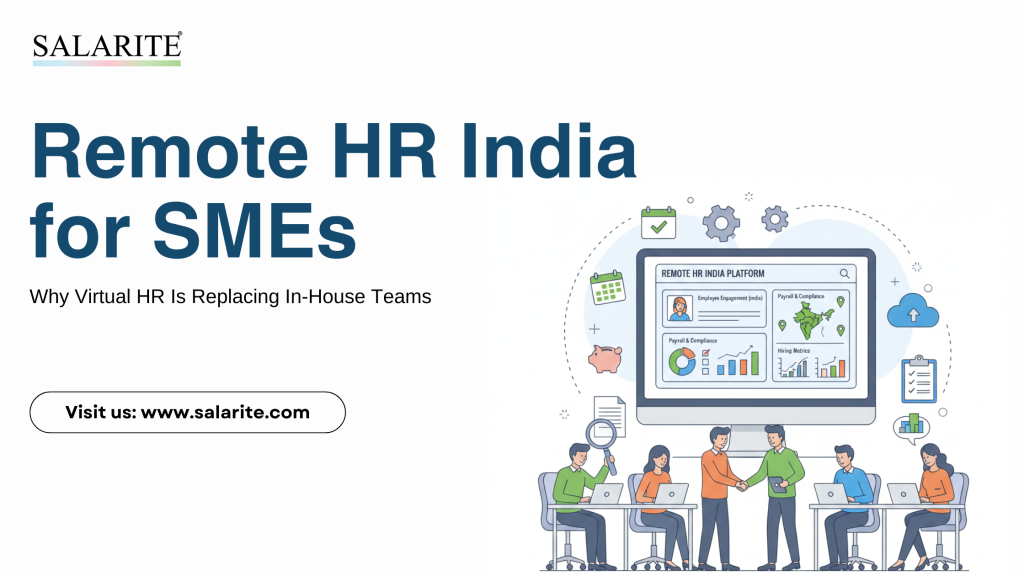
India’s small and medium enterprises are in the middle of a quiet HR revolution. Talent is more distributed, compliance is more complex, and employees now expect digital, self-service experiences at work. In this environment, Remote HR India models are rapidly emerging as a smarter alternative to traditional in-house HR teams, especially for cost-conscious SMEs that still want professional people practices.
This blog breaks down why Remote HR India is gaining traction, how Virtual HR Services and Online HR Management actually work on the ground, and what Indian SMEs should think about before making the switch.
1. Why SMEs in India are rethinking in-house HR
Micro, small and medium enterprises are literally the backbone of the Indian economy. As of September 2025, over 6.82 crore MSMEs employ about 29.77 crore people and contribute close to 30% of India’s GVA/GDP. For most of these businesses, building a full in-house HR team simply isn’t realistic.
Traditional HR models create several pain points for SMEs:
- Fixed salary costs for HR generalists, recruiters and compliance specialists, even when hiring volumes are low.
- Fragmented hiring, onboarding and documentation, often managed through spreadsheets, email and WhatsApp.
- High dependency on one or two HR staff for compliance and payroll, creating serious risk if they quit.
- Very limited bandwidth to design policies, engagement programs, or leadership development.
Regulations around wages, social security and working conditions are also becoming more demanding and digitised. Trying to “do HR on the side” is no longer sustainable for founders. That’s where Remote HR India offers a more scalable, expert-driven model.
2. What Remote HR India actually means
Remote HR India refers to a model where most HR activities are handled by an external expert team working remotely, backed by cloud-based HR technology. Instead of building a full in-house department, the SME partners with a provider that delivers end-to-end Virtual HR Services via a mix of people and platforms.
Under a typical Remote HR India engagement, the provider may:
- Define HR policies, employee handbooks, offer letters and contracts.
- Create job descriptions and run structured recruitment processes.
- Manage digital onboarding, documentation and employee records.
- Drive performance review cycles and basic learning & development coordination.
- Handle exits, full & final settlements, and statutory documentation.
- Advise founders and managers on sensitive people issues.
The aim is to give SMEs “enterprise-grade HR” without the cost and complexity of building the same capability internally. Much of this is delivered through Online HR Management portals where employees and managers can interact with HR from anywhere.
3. The data behind the shift to virtual HR
The growth of Remote HR India is backed by three big macro trends.
a) HR outsourcing is scaling fast
Research shows the India HR outsourcing market was valued at around USD 138 million in 2024 and is expected to grow to about USD 480 million by 2030, at a CAGR of roughly 23%. That kind of growth doesn’t happen by accident—it signals that businesses of all sizes are increasingly comfortable handing HR tasks to external specialists.
b) HR technology adoption is accelerating
India’s HR tech market was valued at about USD 1.1–1.2 billion in 2024 and is projected to reach around USD 2.3 billion by 2033, growing at nearly 7.9% CAGR. Another assessment notes that around 70% of Indian corporations have automated at least half of their HR functions using AI and digital tools.
This is exactly the infrastructure that powers Remote HR India: outsourced teams use Online HR Management systems for recruitment, onboarding, compliance tracking, and analytics, making remote delivery both transparent and efficient.
c) Remote work itself is now mainstream
A 2024 analysis projected that by 2025, 60–90 million Indians will be working remotely, roughly 10–15% of the workforce. Another dataset from a specialist staffing firm shows that about 20% of job postings in India are now for remote or hybrid roles, up from 0.9% in 2020.
When employees, managers and even HR teams are already working from anywhere, trusting an external remote HR partner becomes a small step—not a big leap. Put together, these trends explain why Remote HR India has moved from “experiment” to “default consideration” for many SMEs.
Related: Explore top remote job posting platforms to connect with the right candidates for private jobs in Jaipur. Find out where fresh graduates are searching today.
4. Key benefits of Remote HR India for SMEs
a) Significant cost savings
For a growing SME, a full in-house HR setup might mean:
- 1 HR manager
- 1 recruiter
- Possibly a payroll/compliance specialist
- Plus HR software subscriptions and training
That structure can be expensive when you’re still experimenting with your business model.
By contrast, a Remote HR India provider typically charges a retainer or per-employee fee. Because they spread costs across multiple clients, SMEs can often slash HR operating costs by 30–50% compared to building an equivalent internal team (especially under ~250 employees), while still getting access to strong Virtual HR Services.
b) Access to better expertise
Good HR talent is hard to find and harder to keep. Remote HR India gives SMEs access to a pool of specialists—recruiters, labour law experts, HR business partners, L&D facilitators—who would be too expensive to hire individually.
A founder in Jaipur, Surat or Coimbatore doesn’t need a senior HR leader sitting in their office. Through Virtual HR Services, they can plug into experienced HR professionals who already understand SME realities, sector nuances and regional compliance.
c) Digital-first experience through Online HR Management
Employees now expect a consumer-grade experience:
- Digital onboarding and e-signature of documents
- Self-service for leave, basic data and payslip access
- Transparent performance reviews and goals
- Quick responses to HR queries
Online HR Management platforms used in Remote HR India setups typically offer:
- Employee self-service portals
- Centralised digital employee records
- Automated workflows for approvals, reminders and checklists
- Dashboards for headcount, attrition, hiring funnel and engagement
Result: SMEs can offer “big-company HR” without building or maintaining the tech stack.
d) Better compliance and reduced risk
India’s labour laws vary sharply by state and get updated frequently. Missing a statutory filing or mishandling a termination can lead to penalties and reputational damage.
With Remote HR India, compliance is baked into both process and technology. Providers track regulatory updates, standardise documentation and ensure statutory tasks are completed on schedule. For SMEs operating in multiple cities or states, this centralised, tech-enabled view of compliance is a major advantage.
e) Flexibility and scalability
Business cycles in India can change quarter to quarter. One year you’re doubling headcount; the next, you’re consolidating.
Because Remote HR India is service-based, SMEs can:
- Scale recruitment support up or down
- Add or remove modules of Virtual HR Services
- Extend HR coverage quickly to new locations or business units
All without the friction of hiring or downsizing an internal HR team.
5. Challenges and risks SMEs must navigate
Switching to Remote HR India isn’t a magic wand. SMEs should go in with eyes open.
a) Perceived loss of control
Founders often worry: “If we outsource HR, will we lose control over culture and people’s decisions?”
The fix is clear governance:
- Keep company values, culture, final hiring decisions and key salary approvals in-house.
- Let the Remote HR India team execute process-heavy work: sourcing, screening, documentation, compliance, reminders.
Think of them as an operations engine, not as the people deciding your culture.
b) Cultural disconnect
An external team may not instantly understand your culture, especially in regional or family-run businesses. To make Remote HR India work:
- Involve the remote HR team in leadership meets and key town halls.
- Share stories, values, “non-negotiables” and examples of how decisions are made.
- Nominate an internal SPOC who co-owns HR with the provider.
c) Data security and privacy
Online HR Management systems store sensitive data—PAN, bank details, performance notes.
SMEs should ensure their Remote HR India partner follows strong security practices:
- Encryption in transit and at rest
- Role-based access
- Regular audits and backups
- Compliance with emerging data protection norms in India
d) Over-reliance on a single vendor
Putting all HR knowledge with one external partner can be risky.
Mitigation tips:
- Ensure you own your HR data and documentation, not the vendor.
- Have clear exit clauses and transition plans in contracts.
- Maintain at least a basic internal understanding of core HR processes, even if execution is outsourced.
6. A practical roadmap to move toward Remote HR India
If you’re an SME considering this move, here’s a simple, action-oriented approach.
Step 1: Map your current HR reality
Write down what you currently do across:
- Recruitment and onboarding
- Policies and contracts
- Documentation and employee records
- Compliance and statutory tasks
- Performance and exits
Note what’s working, what’s broken, and where founders or senior leaders are spending too much time.
Step 2: Decide what to outsource first
You don’t have to go “all in” on day one.
Many SMEs start with Virtual HR Services for recruitment, policy drafting and basic HR advisory. Over time, they add more Online HR Management modules—performance, engagement, analytics—into the Remote HR India model.
Decide:
- Which HR activities must remain in-house (culture, critical approvals).
- Which processes can be executed by a remote team without hurting trust.
Step 3: Evaluate potential partners
When shortlisting Remote HR India providers, look for:
- Experience with SMEs in your sector and size band.
- Strong use of Online HR Management tools rather than manual spreadsheets.
- Clear SLAs for TAT on queries, hiring turnaround and statutory filings.
- Transparent pricing and real client references.
Step 4: Run a 3–6 month pilot
Start with one unit, city or function.
Track:
- Time-to-hire
- HR query resolution time
- Founder/leadership hours freed per month
- Employee satisfaction with HR responsiveness and clarity
Use this data to fine-tune your Remote HR India engagement before scaling.
Step 5: Scale and integrate
Once the pilot works:
- Standardise policies, templates and workflows.
- Roll out the Online HR Management platform across locations.
- Treat the remote HR team as an extension of your company, not just a vendor.
The more context they have, the better their Virtual HR Services will align with your culture.
7. Future outlook: What’s next for Remote HR India?
Looking ahead to 2030, the factors driving Remote HR India are only strengthening:
- HR outsourcing volumes in India are projected to grow at strong double-digit CAGRs, powered by manufacturing, IT, hospitality and services.
- HR tech spending is expected to almost double by 2033 as companies automate recruitment, onboarding, performance and analytics.
- AI is moving into resume screening, talent matching, engagement analytics and predictive attrition, making Virtual HR Services smarter and more insight-driven.
- Remote and hybrid work are here to stay for knowledge workers, which naturally supports HR models delivered entirely online.
For SMEs, the real question is no longer “Should we explore Remote HR India?” but “What is the right timing and shape for our transition?”
Salarite: The Smarter Way SMEs Use Remote HR India Today
As Indian SMEs face rising hiring demands, compliance challenges, and tighter budgets, Salarite has become a trusted partner for businesses that want structured HR without the cost of an in-house team. Built around the principles of Remote HR India, Salarite blends Virtual HR Services with simple, efficient Online HR Management to give companies a complete HR backbone from day one.
1. A Complete Virtual HR Department for SMEs
Salarite gives growing businesses the advantage of a full HR team — remotely. Instead of hiring a full-time HR manager, SMEs get dedicated HR professionals who handle recruitment, documentation, onboarding, policies, employee communication, performance coordination, and compliance guidance.
This allows founders and teams to focus on business growth while Salarite manages the people operations end-to-end.
2. Remote HR India Solutions Tailored for Startup & SME Needs
Salarite’s HR model is designed for companies that need flexible and scalable support.
Core services include:
- Recruitment support with verified applicants and interview coordination
- HR policies, appointment letters, and structured documentation
- Employee lifecycle handling — onboarding, leave coordination, performance communication
- Compliance support and documentation accuracy
- Smooth digital workflows through Online HR Management tools
Everything is delivered remotely, making HR faster, more organised, and easier for SMEs.
3. Technology-Enabled Online HR Management
Salarite replaces spreadsheets and manual processes with a clean, digital HR workflow. Documents, employee updates, internal communication, and process tracking become organised and accessible. This reduces HR mistakes, improves transparency, and ensures businesses stay compliant without investing in expensive software.
4. Scalable for Fast-Growing SMEs & Startups
Whether you’re hiring rapidly or managing a fluctuating workforce, Salarite adapts instantly. HR support can be scaled up or down based on new projects, growth phases, or expansion into new cities — without any long-term commitments or fixed payroll cost.
5. Affordable HR Excellence — Without Hiring Full-Time Staff
Salarite provides professional, structured HR support at a fraction of the cost of an in-house HR team. No salaries, HR tools, or training expenses. Just predictable monthly pricing designed to fit every SME’s budget.
Salarite vs. In-House HR: Which Is Better for SMEs?
| Feature / Benefit | Salarite (Remote HR India) | In-House HR Team |
| Monthly Cost | Low, predictable, zero overhead | High salaries, training & tools |
| Hiring Support | Fast sourcing & coordination | Limited bandwidth |
| HR Expertise | Access to a full remote HR team | Depends on 1–2 hires |
| Scalability | Scale anytime | Fixed costs always |
| Documentation | Ready-made, compliant & uniform | Often outdated or inconsistent |
| Compliance | Guided support reduces risks | Higher chances of errors |
| Setup Time | HR starts immediately | 30–60 days to hire |
| Technology | Online HR Management included | Requires extra software spend |
This comparison makes it clear: for growth-focused SMEs, Salarite’s Virtual HR model delivers higher value with lower cost and greater reliability.
Why Salarite Leads the Future of Virtual HR in India
- Built specifically for SMEs and startups
- Fast onboarding and remote HR setup
- Professional HR support at affordable monthly plans
- Compliance-ready documentation and processes
- Digital-first system that simplifies daily HR work
Salarite gives businesses the power of a complete HR department — without hiring one.
Start Your Remote HR Journey with Salarite
If you’re ready to streamline HR, reduce operational costs, and build a more organised workplace, Salarite is the ideal partner. With Virtual HR Services and tech-enabled Online HR Management, you get everything your business needs to run HR smoothly from day one.
👉 Choose Salarite — and build a stronger, faster, more efficient HR foundation for your SME.
Conclusion: The Quiet but Powerful Rise of Remote HR India
The shift from traditional in-house HR to Remote HR India isn’t just a cost-saving tactic — it represents a deeper transformation in how modern SMEs operate. As regulatory demands rise and businesses move toward digital-first systems, founders are discovering that virtual, tech-enabled HR delivers stronger results than outdated HR structures ever could.
With Virtual HR Services powered by streamlined Online HR Management, companies gain access to better hiring support, consistent documentation, expert compliance guidance, and a far more professional employee experience — all without the weight of full-time HR overhead.
This is exactly where Salarite stands out. By offering SMEs a ready-to-deploy, scalable, and cost-efficient Virtual HR model, Salarite helps founders skip the burden of building an internal HR team and instead focus on growth. Its structured processes, digital workflows, and human HR support make it easier for businesses to run people operations smoothly from day one.
When implemented thoughtfully, Remote HR India can:
- free leadership from daily HR firefighting,
- introduce strong people practices early,
- give employees a modern, transparent HR experience, and
- significantly reduce compliance and operational risks.
For SMEs aiming to scale without rising fixed costs, this is the perfect moment to embrace a lean, digital, and future-ready HR model. With partners like Salarite, the evolution from traditional HR to Remote HR India is not just beginning — it’s quietly becoming the new standard for India’s next decade of business growth.
FAQ’s
Remote HR India is a model where SMEs outsource HR functions to a remote HR team instead of hiring full-time in-house HR staff.
It helps businesses manage hiring, documentation, employee support, and compliance digitally, reducing costs and improving efficiency.
Remote HR is better for SMEs because it cuts HR costs, improves compliance, and provides expert support without fixed overhead.
Companies get flexible, scalable HR services that adapt to changing workforce needs faster than traditional HR setups.
Virtual HR Services include remote hiring support, HR documentation, onboarding, employee lifecycle management, and compliance assistance.
These services bring professional HR processes to SMEs without requiring a physical HR team.
Online HR Management is a digital system that handles HR tasks such as hiring, onboarding, employee records, attendance, and compliance online.
It centralizes all HR operations into one organised platform, making remote HR easier and more accurate.
Salarite helps SMEs by offering a complete Virtual HR team that manages hiring, documentation, compliance, and employee processes remotely.
It gives businesses a ready-made HR department at a lower cost, supported by structured digital workflows.


